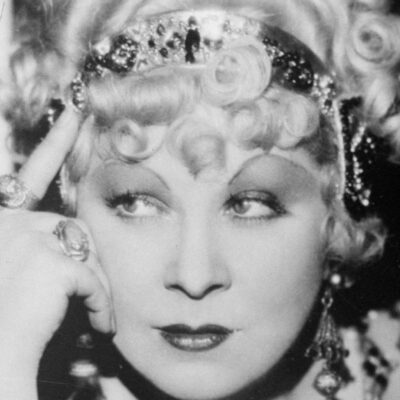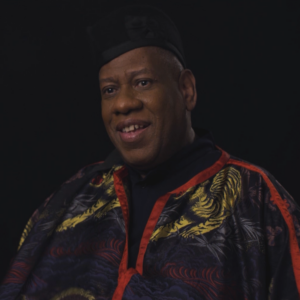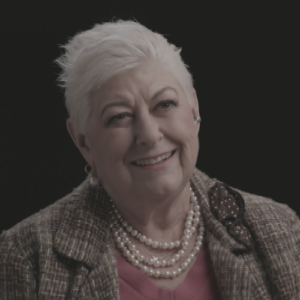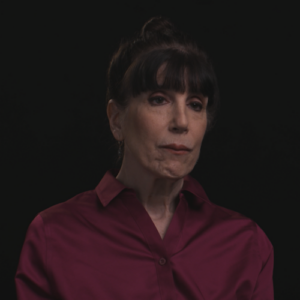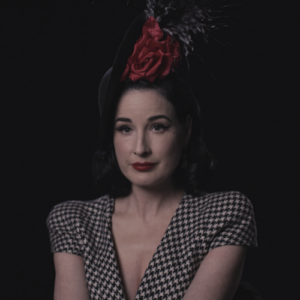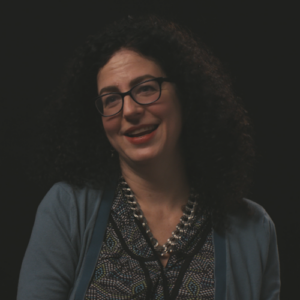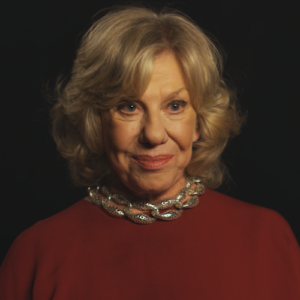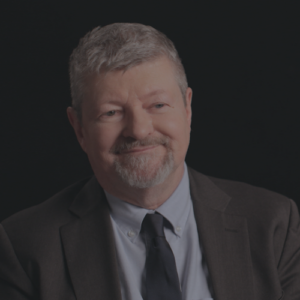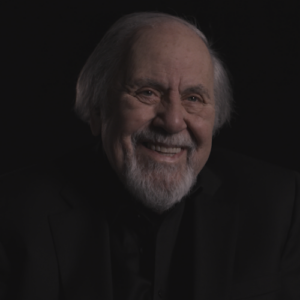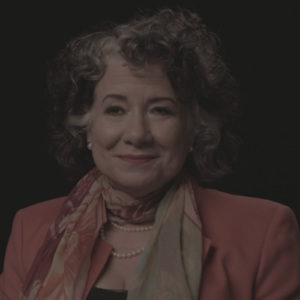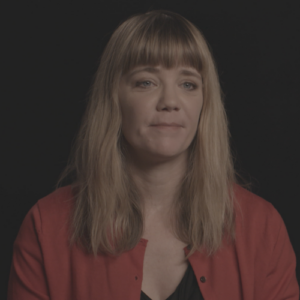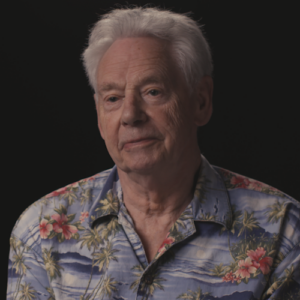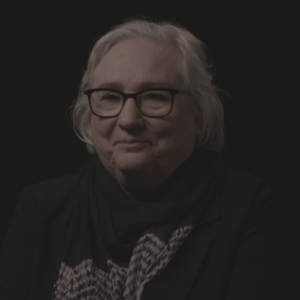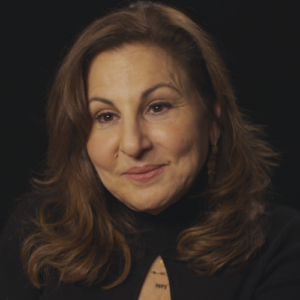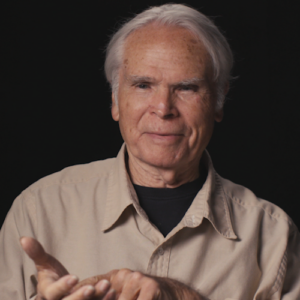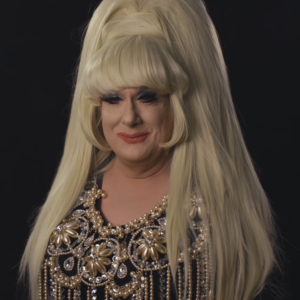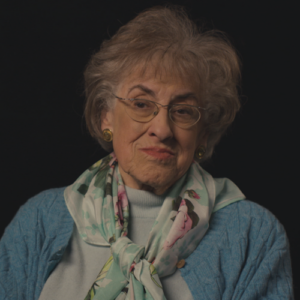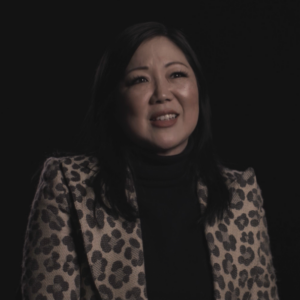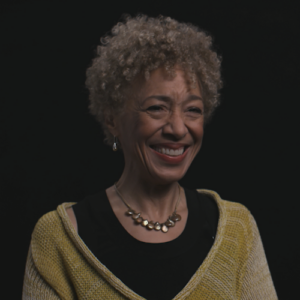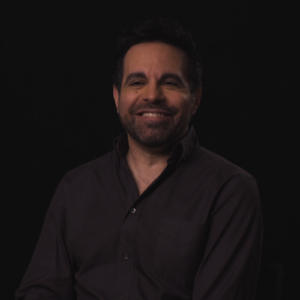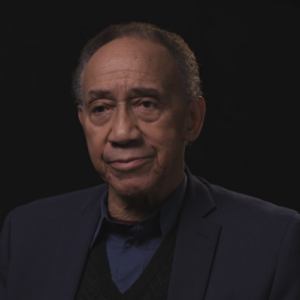Interviewer: Do we know about Mae West’s parents?
Jill Watts: So Mae West is the daughter of John Edwin West and Matilda Delkar. And her parents are working class poor. Her father grew up in the Lower East Side. His father was a rigger. He worked on the whaling vessels after whaling went under. He was basically just a laborer. He grew up in the tough neighborhoods of the Lower East Side. Family was very poor. His his John West mother was Irish immigrant. She came during the potato famine. And so you can see in his early life, he grows up on the scrappy streets of New York City. He’s fighting. He doesn’t have much of an education. Her mother is a German immigrant and she comes from Germany at the age of 12. And again, the family’s very poor. They move into Brooklyn and live in Bushwick, in Brooklyn. And you see the family there like like John was family living in the tenements. Working class, getting kind of any job they can to survive her. Her grandfather was a laborer. Her mother, eventually she grew up, became a seamstress. And so they’re just trying to put things together economically. They they aren’t wealthy in any any form. Although later on, she tries to make it seem as if she comes from a very elite family and traces herself to all kinds of royalty. And it’s not at all. It’s a family that’s very, very poor.
Interviewer: Is there anything else we can say about, like the neighborhood of Bushwick in the late 19th century? Was it all immigrants working class? Like, was there any any other color we can get?
Jill Watts: So in Brooklyn, she grows up in the Bushwick neighborhood, and Bushwick at the time when she’s growing up is kind of in transition. There’s still on the one edge open fields and there’s farmers late into the late 19th century, but it’s becoming rapidly urbanized and built up and the population becomes increasingly denser and denser and denser. So it was also the center of the brewing industry in in and especially for German immigrants. German immigrants are coming and settling in this area like her mother’s family did. And her mother’s family had ties to the brewing industry. And later on, that becomes really important because when brewing becomes illegal, then organized crime takes over. And so that allows the family these connections with a lot of organized crime figures.
Interviewer: Perfect. What do we know about her relationship with her father and with her mother?
Jill Watts: Okay. So so Mae West had a difficult relationship with her father. You can see there’s a lot of tension between the two of them in a lot of ways, where she compares herself to him, He’s he’s kind of a scrappy fighter. He’s he was a bare knuckle prizefighter in the in the era when it was the most violent of sports. He takes her along to the to the boxing matches and even teaches her how to box. But at the same time, he’s impatient. He’s a volatile temper. He’s often gone and she really dislikes him. She doesn’t like his cigars, she doesn’t like his manner. He she doesn’t like the way he treats her mother at all. So they have a very, very difficult relationship. Her mother, on the other hand, she has a very, very close relationship with her mother. And she would say that her mother understood her better than her father did. Her father was always trying to force her to do things. And her mother understood that she had this very independent spirit and the stubbornness. And so she would work with the stubbornness. She would coax me West to do stuff rather than tell me was to do stuff. She bonded with her mother because her mother had a great affinity for American popular art. And I think what’s happening is, as a young German immigrant and she’s learning the language, she her mother goes to the performances and theater and vaudeville, and that exposes her to the language. And so she comes to learn the the the ways of Americans. And she really embraces it. She Mae West, mother love the popular stage and of herself wanted to be a performer. Right. But, you know, she couldn’t she couldn’t make it. She is a German immigrant with a heavy accent. But here she has this beautiful daughter who is really talented and she’s able to do all these impressions and she dances and she sings so she can actualize her dream through through her daughter.
Interviewer: Perfect process. Okay, this is great. Does this all percolate in perfect length? Do you I mean, first of all, what do how do we know all the things that you’re saying right now about these early? How do we know this stuff?
Jill Watts: Okay, So how do we know what we know? So untangling Mae West biography is difficult because in a sense, you have three different entities. You have Mae West, the character that we see on film. You have Mae West, the star who wants to convince you of certain kinds of truths about her background. And then you have a real person there. So a lot of what you can tell about Mae West comes from her biography, but you have to intersect it with public record and for working class people, that can be a challenge because their lives go unrecorded in in public record because they’re not that important. So but you can find in the city directories in the newspapers a lot of this, a lot of this life story can be be discerned, even if it’s not definitely mentioned.
Interviewer: I mean, in terms of her mother, the way she talks about her in interviews or in her book, it feels like she was a really spoiled kid. Is that the impression you got.
Jill Watts: Now that I’m dealing with teenagers? Right. Mae West and her mother, that the tight relationship, I think, comes because her mother lost a baby just before there was a child born two years beforehand and she dies, likely of cholera. And that’s a pretty horrible death for for an infant. And I, I think when Mae West comes along, she becomes this kind of prized treasure that her mother has to protect in every way possible. And I think she divides her from her father. And they’re not on the same page about how to raise her. And I think she creates this kind of bubble around Mae West. There are two children. Subsequently a daughter named Mildred and then a son named John. But she doesn’t meet his mother, doesn’t pay near as much attention to those two. And in fact, according to Mae West, punishes them very harshly, where she’s allowed to kind of get away with almost everything. So I do think I do think in a lot of ways, Mae West mother gave her special treatment, spoiled her. She was the favorite child.
Interviewer: And how do you think that childhood experience shaped the character that she became, the persona she created?
Jill Watts: I think most of what Mae West becomes shaped by her mother and by the antagonistic relationship she built Phelps with her dad. I think that she’s empowered even from an early age. She gets her way and she doesn’t like to be told no. And so as she grows up in a world that’s constantly telling her no, she can’t accept that, you know, and she enters the popular arts, she’s told, no, she can’t do that. But she decides that, you know, she’s not going to obey by the rules. And she didn’t have to be by the rules early on. She was special and treated special. So so I think that a lot of that upbringing and then I think also the father, the relationship with their dad, since it’s so poor, it she just never reconciles that and she sort of Katzmann in a certain category as she views them justifiably as oppressors, but also as people who disempower women purposefully.
Interviewer: How do you think and what kind of talk about some relations with men later, But how do you think this her father affected her relationships with men, her romantic relationships?
Jill Watts: You know, it’s interesting to look at the relationship with her father and ask what kind of impact it has later on with with men, because I think that she had such a such a difficult relationship with him and never was close to him. And you see, men subsequently say they could never get close to her. Even people who admit that they were her lovers talk about how disinterested she was. She really wasn’t involved in lovemaking. And I think that that that could come from her father. But I think there are also other men in her life early on that shape her relationships with men. Later. People have speculated that that Mae West was a victim of child abuse, of child sexual abuse. And there’s a lot of kind of veiled references to it in her life story. And but she does actually admit at one point, just before she quit school at the age of 14 of being abused by a male teacher. And I think the abuse goes just beyond just being abused. I think, you know, it’s sexual abuse. And she quit school right after that. And so I think that her early exposures to men, you know, with this kind of violent, ill tempered father and then kind of being exposed to this kind of sexual abuse in the with with a teacher in the classroom actually state after school. You know, I think that that shapes what she experiences later on with men, the relationships she forges with men later. It’s just she’s unable to, I think, forge a closeness until late in her life. I think later in her life, she was able to find that kind of relationship in that kind of love. Right. So where did.
Interviewer: She talk about that abuse? Do you remember?
Jill Watts: You know, with in looking at her, telling her life story, she tells it different ways at different times. So sometimes a story that sounds one way, for instance, the story in first time where it sounds like, oh, this is my first time, you know, I’ve been experienced. She tells it in another instance when it doesn’t really sound all that pleasant. Actually, it sounds like she’d been violated. So I think that’s the that’s part of Mae West. She’s everything in nothing all at once. She just pivots constantly. And so I think the ability to pivot between extremes is one of the magic parts of her performance. So and I think that’s one of the challenges in telling her life story, though, is in some ways it reads one way, in another way it reads another. And I think she herself probably was conflicted.
Interviewer: That’s a great answer. What so let’s talk generally again about the, you know, the context of the West, and they’re living in Brooklyn in the turn of the century. What kind of entertainment was sort of and you were sort of mentioned earlier, the mother was into popular theater. What kinds of entertainment with the family of the.
Jill Watts: Turn of the century, New York and Brooklyn. They’re filled with opportunities to partake of popular American culture. I mean, it’s everywhere. I mean, New York is a mecca. It is the entertainment mecca of the United States. In 1900, when she’s a child. Coming up, you can go to vaudeville, you can go to burlesque, you can see serious theater. There’s opera, working class. People went to opera in those days. There’s all kinds of varieties of music. There’s all kinds of ethnic theaters, there’s street performers, there’s music in churches. It’s everywhere. So so to not have been exposed to it would have been unusual. And then on top of it, her mother is so invested in the theater and she loves the theater and she loves the major American stars, Lillian Russell, who was the great diva of the American stage, Ethel Barrymore. A little bit later, Eva Tanguay, the very controversial I don’t care, girl. She takes me to see that. I mean, and that’s pretty adult entertainment that she’s exposing her to. There’s also star companies who play the old time melodramas that go. All the way back, you know, before the Civil War. So and then there’s the minstrel shows, which are whites, primarily whites, donning blackface and parodying black music. But there are also African-Americans who are performing in their own minstrel shows and performing their own art, sometimes often in blackface as well, in order to cross over and reach other audiences. But she’s exposed to all these varieties of mass culture.
Interviewer: And because you mentioned the minstrel shows, can you talk a little bit about Bert Williams generally? Just who was he and the level of his fame? And we know that Mae saw him.
Jill Watts: Well, I would we know, according to Mae West, she met Bert Williams, and he was when she met him, he would have been one of the top entertainers in America in his day, even though he was African-American, he had managed to rise up through the entertainment ranks and had actually been on Broadway and eventually in a mixed race cast, which was very unusual. The white female performers weren’t allowed to be on stage with him when he was on stage because of the racial codes of the period of time. But so Britt Williams was probably, I mean, without a doubt, one of the most successful African-American performers. And then amongst American performers, he was recording records and and performing in all kinds of venues. So. So did she see him? It’s not entirely clear she saw him perform, but she claimed that her father was an acquaintance of Bert Williams. And it’s likely so. Bert Williams was himself very invested in boxing, and he was very connected to boxing circles, as was her father. And I think it’s very plausible that through those circles he met him and she talks about him bringing Bert Williams home for to visit one evening. And actually, you know, she did see him because when she I should relate this differently because now when I’m telling you this, I’m remembering.
Interviewer: All right. Yeah, that’s great. So.
Jill Watts: So I’ll start.
Interviewer: To say Bert Williams actually came around.
Jill Watts: Bert Williams actually came to her house. And when he comes to the door, she won’t believe she believes her father has lied to her and said, hey, you know, this is Bert Williams and she doesn’t believe it because he doesn’t look like the man that she’s seen on stage or Bert Williams sheet music where he’s wearing blackface makeup and she won’t believe it. And she runs to her room, she says, crying and slams her door. And Bert Williams comes to the door and sings one of his hit songs. And then she realizes, Oh, wait, this is him. And she comes out. What’s really interesting about that episode, though, is as she reflects on it later, she says what she realizes is, is that the popular culture depiction of Bert Williams is not the man and that she sees the disjuncture between who black people really are and how they’re performed within American popular culture. And I think that was pretty earth shattering for her.
Interviewer: What did she take from her? Williams How did he influence her developing an act.
Jill Watts: Which she takes from Bert Williams, I think is pretty subtle. Bert Williams, when he delivered a lot of his music, delivered it in a kind of a spoken form, and she talks about borrowing that form, speaking her, her songs and her music. But I think it goes even deeper, and I think she borrows from Bert Williams, but I also think she borrows from African-American blues singers and other African-American performers. And that is the idea that you can take popular culture and convey two messages at once with it. This is a practice called signifying in the black community, where you on the surface say one thing, but underneath actually reverse it. And Bert Williams is always doing that with his with his music and his performances. And I think she studied that in him. And then later on, when she’s exposed to blues music as it comes into mass circulation, I think that that’s what provides her the foundation for her comedy and but also for being serious, because on the surface it might be a joke, but underneath it’s a real interrogation. It’s a criticism.
Interviewer: As she’s, you know, she’s a teenager. What is she developing ideas about that she wants to signify? You know, like what is she trying to say? What are the the social commentary that she starts to want to make?
Jill Watts: Because I think with Mae West, what you find is the messages change over time. Okay. I think as a teenager, her mom puts her into a stock company really young and she doesn’t have much room in the stock company to create a performance. And she’s little. But as she grows and she’s exposed to more and more culture, I think as a teenager, the earliest skits you find her doing, she’s taking on these Bowery characters and revising them. So she’s making kind of class commentary, but also commentary on gender. And one of her earliest acts, you see her pair up with a with a with a male partner and. Really flip the act where she’s the powerful one and he’s the weaker one. And so you see that just that early beginning of the the Mae West character that’s not going to be dominated by men.
Interviewer: What can you do? We sort of back up and describe her first real performance.
Jill Watts: Mae West First performance is at a talent show in Brooklyn in her mother’s can. She’s right. There has been kind of nurturing this and encouraging it along. She does impressions for friends and sings and dances a little church social here. So her mother enters in a talent contest and she’s billed as Baby Mae song and dance. And she’s at the in the wings and she won’t go on and she won’t go on. And she’s waiting for the spotlight. So finally, when the spotlight swings, she runs to meet it. And as she talks about, she runs to meet it without any kind of hesitation that she just embraces the spotlight. And that’s what she’s been waiting for. And from then on, in her own, in her own story, that’s where she emerges as performer Grace.
Interviewer: Do you think how do you think Mae and or her mother was seeking fame or was it something else?
Jill Watts: I think with Mae West mother, what she’s seeking is to live her life through her daughter. I think that that’s what she’s doing and that could be fame, but that could also be kind of incorporated into the American mainstream. You know, as an immigrant, that’s a goal for her. Same for her daughter. Yes, I think definitely I think there’s a it’s a complicated it’s a complicated equation. I think going into the popular arts brings enormous fame, but it can bring wealth to a family that’s struggling. And her dad is just a lower level muscle man for gangsters. He’s providing protection for these bad guys. Right. And he’s not making much money. He he, he he’s a working class guy. Her mother, you know, Mae, taken at the beginning sewing, but the possibility to be able to establish yourself and not just get fame, but also to get economic security. I think that’s that’s a that’s a big motivation for me, though. I think I think early on she recognizes all those things. But there’s also power. There’s power that comes with being a performer even early on. I think she realizes that.
Interviewer: Do you think she was overly sexualized at an early age in these performances, or how did that kind of come about, the sexualization of her.
Jill Watts: Life early on? I. I think that her mother encouraged these kind of overly sexualized performances. I think it’s complicated in the era that they lived in. I think putting kids on to do kind of burlesque in adult females were, you know, heavily hypersexual, was regarded as humorous and funny. But I think it also has a certain impact. You can even see Shirley Temple being encouraged to perform in this way in the in the thirties when she’s young. And so I think the same thing occurs with Mae West. It’s a different result, though. Right. So, so so I think it’s part of an act that was not that uncommon for, you know, baby made to do this or other children. But I also think that I think that, again, is something that sells whatever sells, right. Sex sells. Even back at the turn of the century, they knew that sex sells. So when she as she becomes older and realizes what she’s actually doing, I think she buys into that. But I think she sees it as a much more complicated equation than her mother does. It’s not just getting attention and getting fame and getting money and selling an act. The act itself can become revolutionary. And I think she realizes that pretty early on. It’s just I think in the earlier years when she goes from being a teen performer all the way up till the 1920s, she’s trying to find something. She’s trying to find that the right vehicle, right. So that she can emerge as ultimately powerful in the stage. It’s not just finding the right act to be famous and to to make money, but the right act that just fits to do what she wants to do, which is more than just be a performer.
Interviewer: I think it’s to say something.
Jill Watts: Yeah. Is to send a message.
Interviewer: What does that mean? Oh, that’s good. I mean, it’s like in class. Okay.
Jill Watts: Why did Reconstruction end? Yes. So. Yes. So I think her intention is to send a message. I think early on she realizes that she can send a message about gender. But I think as she continues to hone that performance, she realizes it’s a lot more powerful than just sending a message about gender. She can send a message about class. I think also she can send messages about race and politics. If you think about the world that Mae West grew up in, up till 1920, women in America didn’t vote. Women didn’t have the vote. And even after 1920, women didn’t have a lot of economic power. If you had to get a loan, you had to get it through your husband. Right. And so Mae West emerges in this world where she is. Is totally constrained as a working class woman, as as as a as a woman and then as a performer. I mean, performers aren’t highly regarded in that period of time, too, so. So to do what she did to create this kind of volatile character, which eventually emerges in the 1920s, which is interesting because that’s when flappers come out and women get the right to vote. That’s pretty amazing.
Interviewer: Do you think there’s something about theater in this period that was sort of a free place for women? Maybe it helped her show hers with more progressive ideas about gender. Oh.
Jill Watts: You mean in the 1920s or early 19? Early the turn of the century? Yeah. I think the thing about Turn the Century Theater, I think that you have a lot of women’s stars that emerge on the stage and that actually it goes back to the Civil War era, where women are able to forge these careers and become really celebrated American stars. And that gives them a certain power that they wouldn’t normally have in the society and in the culture. Right. So so, yes, yes. I think that stage in that period of time, I have to do that. I’m sorry. So staged in that period of time offers a venue in which women can actually not only get economic security, but also adulation in the American society. There’s really, if you think very few venues for women to emerge as public figures in America at that time, there’s very few venues and the stage is one of them.
Interviewer: You’ve sort of referenced it, but just so we have it, she did not basically get an education. I mean, as far as we know, I mean, which is pretty amazing considering what she then went on to do, but you just sort of reiterate how she went.
Jill Watts: Yeah. So Mae West was had very little education. She. She quit school at the age of 14. Her schooling before that was sporadic because she had gone into this stock company and they toured. And so she she talked about having private tutors. And I’m not so sure how how, how real that was. I think her mother did a lot to try to teach her. And I think it’s interesting because in a lot of ways, she had been learning along with her mother, because her mother was still fairly new to the country and new to the language. So so, yeah, So she she’s not a well educated person, but one of the things Edith had said once was, is that she was completely poorly read, but she was totally articulate despite the fact she had no education at all and she was well informed.
Interviewer: But also she had this fascination with words. Right. Right. Language. Is there anything we can say about that? I mean, it’s kind of unusual for somebody to have much of an education.
Jill Watts: Yeah. I think Mae West fascination with words. I think it comes from a lot to a large degree, her mother, who’s learning the language. And I think as she’s learning the language, she imparts that that curiosity to to me, I think that that that’s not an easy task to come speaking as a child. No English at all. And then, you know, within a few years be able to be fluent So and so I think that that was encouraged in the home. And I also think, though, as a performer, language means a lot. That’s how stage communicates its messages is through language. So people become interested in words and how they sound and how to play with them.
Interviewer: Oh, just a couple influences. If you can just briefly talk about. You mentioned Eva Tanguay, but what was her shtick and how did she influence Mae?
Jill Watts: So Eva Tanguay, if a Tanguay in her era was what Mae West would become, she pushed all the envelopes. She pushed every boundary. She was from Canada, and she came to United States and performed and rose to stardom. So Eva Tanguay comes to the United States from Canada, and she pushes all the boundaries. Hypersexualized performance at a time when even the stage, even the stage women were regarded as totally legitimate. She was beyond what was considered acceptable and acceptable. Theater was, you know, high drama. And even tango took kind of the burlesque and tide of mainstream it in. And it was not just it was in the costumes, which were very revealing. It was in the kind of liberated dancing and the songs which are double entendre songs. And she, you know, she became known as the I Don’t Care girl because of her freeways. And then there was also the celebrity dimension to Eva Tango, which you you kind of believed that she was also who you saw on the stage. So in many ways, she provides a very early format that Mae was can kind of plug herself into.
Interviewer: Perfect. What about Savoy.
Jill Watts: Brit? Savoy. So Burt Savoy was one of the most popular drag performers of the era. He was considered outrageously funny, his character. Was a man starved, desperate for love. He performed in vaudeville, in in incomplete drag. And people just thought he was uproariously funny. And his his tagline was, You must come over some time. And so a lot of people believe that Come up and see me sometime. Has some genesis. Inverts the voice performances so great.
Interviewer: So how did Mae West spend her teenage years, if not in school? Was she doing.
Jill Watts: I don’t even think about it in her teenage years if she’s not in school. I think when she quit school at 14, she spent a lot of it working, trying to, you know, be in theater and be on the road and and put together acts and and make it in the in the entertainment industry, in the show business industry, which is in the turn of the century, which is about that time. It’s it’s itself starting to take off. It’s spreading beyond New York City and other central centers are becoming places where you can see all the popular arts. But she does talk about romances with neighborhood boys and their roller skating and doing those kinds of things. But it’s not very convincing when she talks about it. When you read about in her autobiography, you think it doesn’t sound like a whole lot of fun, which when she starts talking about putting her performances together, that’s where she seems like she was investing her energies.
Interviewer: So would she be when she was young? The vaudeville stage? Was that would she be doing it this time?
Jill Watts: I think between 14 and 17 she’s on the local stages. And so it’s not that upper level vaudeville at all. She’s finding local venues to play. It’s not until she hits 17 and she gets in this act, which is she? It was in the Bowery Act in which she kind of flips the characters once she gets into that. Didn’t you see her kind of break into the lower level tiers of vaudeville? So there’s stages hierarchical in that time rate. There’s legitimate stage. We have Shakespeare in the legitimate plays. You have maybe Broadway, which is maybe next in the hierarchy. You have vaudeville, and vaudeville has several levels. It’s like the key circuit is the best circuit, and then there’s second and third tier vaudeville, and then you have burlesque. And she’ll also end up in burlesque as well. And burlesque is not what we think of burlesque. It’s pretty mild compared to when we think about burlesque. It’s pretty much closed, but it’s a lot of hoochie coochie dancing and things like that. So.
Interviewer: So what was the big act that she got into when she was 17? Mike Wallace.
Jill Watts: So Frank Wallace was a not so successful song and dance man. A little bit older than me, kind of rattling around in the burlesque circuit, never really all that all that successful with his acts. And they end up in a show together where they’re partnered off and a little romance kind of commences. I think there’s some dispute about how romantic the romance was. She was pretty young, you know, she was 17 and one of the other players in the troupe takes her aside and says, you know, you like Wallace, but you’re playing around with all these other guys. So safe thing to do is marry Wallace. That way, if you get pregnant, then you can have somebody to blame at all. So, so so when they hit Milwaukee, she marries. WALLACE But then once the tour is over, she dumps him and they kind of go their separate ways, but she forgets to get divorced.
Interviewer: We’ll come back to that if it doesn’t seem like, you know, it’s this marriage of convenience thing, but it doesn’t seem like marriage. And the traditional female life at that point is sort of what she’s looking for. Right. Right. Even at that young age. Right. Right. Can you talk a little about that? Like she has a different plan for her life?
Jill Watts: Yeah. The marriage to Wallace is unusual because she had to have known it would have completely infuriated her mother because to be a married woman would be basically to kind of resign from any kind of career in that period of time. So so I think it’s a marriage of convenience. I think she did it because she was pushed into it. That’s why she immediately jettisons jettisons him when she gets home. And he’s going to be an impediment to her if she wants to be a successful performer on the stage. So she has to get rid of him. No marrying woman can continue. Schoolteachers can’t even continue in their careers. Right. So not even not even a stage performer is going to be able to pull a marriage off like that. So.
Interviewer: And what was you you mentioned the to the hierarchy of theaters. What was her goal? What was she trying to reach? Broadway. What was trying to do?
Jill Watts: Yeah, Early on in the Gulf War, Mae West, I think early on is Broadway. I think that’s where she sees herself and that’s where she wants to be a legitimate theater. Beyond her reach and it’s beyond her style and she knows it. But Broadway, which is really blossoming in the teens, is definitely a goal for a lot of performers in this period of time. And and she wants to pursue that goal. And so a marriage would definitely stop that. Its importance should be seen not only for career choices and stuff like that, but just to be seen publicly as a desirable woman. Right. It’s important that she not be married.
Interviewer: When does she finally get to Broadway?
Jill Watts: So Mae West first arrives on Broadway in September 1911. She’s cast in a play called Black Broadway, where she plays an Irish maid called Maggie O’Hara. And she’s an absolute hit on the Broadway, isn’t. But she steals the show because of some mishaps backstage. She ends up going out earlier and longer and adds choruses to her song called They Might Be Irish, where she sings the song in a variety of different dialects, playing a variety of different characters. She adds nine nine verses to it, and the crowd loves her and she takes down the house with it. Like I said, though, the the play itself is a flop. But Mae West actually it established her as a potential star for Broadway right there at that moment. And so she’s going to go on and she’s got the attention of the Schubert’s who want to take her into the next production.
Interviewer: So I think what happens, though, is that she doesn’t get a million parts on Broadway.
Jill Watts: No, no. But at the at that point, actually, at that point, she was hot property because the Schubert’s recruiter right away in November 1911 to go into Vera Violetta. Right. And Vera Violetta stars Gaby displace the great French Parisian star who has come to America and brought her ego and her outlandish performance as she was famous for the kind of big showgirl hats that you see in Las Vegas. Chorus girl outfits right now. So. So, Gaby, this lace is cast in this, and they do an out-of-town tryout. And so in the out of town tryout, May’s character goes on before the sleaze character comes on. And actually, what she has made is a costume that looks like Gaby display’s costume. And she goes out and she actually does her shtick.
Interviewer: This.
Jill Watts: And it. And the house goes crazy and it brings down the house. And actually, it was the night of the football game. It’s in Connecticut. The football players have a riot. You know, because she’s so awesome, Right? And Gaby does Les has a meltdown because he has totally upstaged her. And actually even Bush before she can come out there, they’re stomping and calling for more and more, more, more that the the theater kind of shuts down. And they the crowd goes crazy. They tear out the seats and they riot in the streets. People get arrested. That’s what hurts her in terms of continuing on Broadway because she upstages this great star and she’s unpredictable in this way. So then she’s kind of consigned to back into the burlesque slash vaudeville circuit. So that’s that impedes this attempt to rice her first attempt.
Interviewer: Great. So, yeah, So she goes back and she travels around. She just called back on the circuit at some point, I think in here she goes to Chicago.
Jill Watts: Right. Right. In 1917.
Interviewer: Yeah. Let’s talk about that. Why? That’s an important moment of her being in Chicago. And specifically related to the shimmy dance.
Jill Watts: Okay. So during World War One, she ends up in Chicago, she leaves New York. Her careers kind of stalled out there. She goes to Chicago, and she’s playing on the smaller Midwestern vaudeville circuits and picking up jobs in clubs and things like that. And it’s a really important time for her in terms of her her development of her performance style in Chicago. What’s happening is the African-American community is growing. The Great Migration from the South begins in 1915, and it and it continues up until 1930. A million and a half African-Americans leave the South. They’re fleeing the racism, the poverty, but they’re all also going to into the cities of the Midwest, in the north, for jobs that are being created by the war industry. And so what they’re bringing with them is all kinds of cultural formations from throughout the south, and they’re sharing them in the nightclubs and in the theaters. And Mae West actually patronized these nightclubs. And as she’s, you know, in and out of Chicago, she patronized some of the most important jazz and blues clubs. And so she observes African-Americans performing jazz music. She listens to the blues songs, and she starts to appropriate those and think, you know, these are would be great for my performance, especially those of the blues. Women. Blues women are really important in this period of time. They’re singing songs not just about the experience of being black in America. They’re about that, but they’re also about being black women in America. About racism. And so Mae West hears this. She also sees the African American dance traditions that are being performed in the nightclubs of Chicago. And so she appropriates these and brings them into her act. And then when she returns to New York in 1919, she comes back a completely different performer before her, before she goes to Chicago. She’s kind of casting about and she’s trained on all these different kinds of performance styles. She’s Parisian and one she’s down and dirty may and another. And when she comes back from Chicago, she comes back with pretty much which you’ll see later on. She’s this blues singing, slow dancing, slow performing, double entendre, but also double messaged person when she returns. And that’s that’s so important because when she comes back to New York, she wants to bring all that that she’s learned in Chicago to the New York stage.
Interviewer: Great. Can you speak specifically about that dance?
Jill Watts: Shimmy dance? Sure. Sure. So in the nightclubs of Chicago, in the teens, the shimmy is is often performed. And it’s performed as a couple starts. Often, but often it’s performed by a single woman. And the thing about the shimmy is the shimmy is kind of it’s a critique of of European dance traditions. Mae West was a coochie dancer and hoochie coochie dance scene is kind of all hips. And and it was not uncommon in burlesque. Shimmy dancing is an interrogation of hoochie coochie. It emanates from the shoulders down and it’s a slower kind of in a way, a faster and slower kind of dance. And so she sees this, and she loves it because she thinks it’s so much more meaningful than the hoochie coochie dance, which is just a dance, right? But she sees something that goes deeper in the shimmy dance. It’s sensual, but it also conveys other messages about suffering and about pleasure, but about pain as well. So she’s determined to bring the shimmy dance into New York and perform it on the stage there.
Interviewer: I think this blues women’s analogy or this connection is really important and maybe you expand on it a little bit, like, what were these blues women saying about what was their sort social commentary that she was picking up on?
Jill Watts: I think if you look at the blues, women of the teens and then the early twenties in the African-American community, it’s it’s so multilayered. I mean, so much of the blues music is about experiencing racism, fleeing the South. The music that people are taking into the clubs. But it’s also about experience, the oppression of of being a woman and being a black woman in society. So there’s multiple voices going on in blues music.
Interviewer: And how would Mae what would she take from that to say, Oh, that I can. That’s partly what does she see in it for herself?
Jill Watts: Well, I think blues music, it carries that double meanings. And I think she’s already kind of been exposed to that through Bert Williams. But now she sees women performing it and and investing it with certain what we would call proto feminist messages. Right. And so I think it has that kind of meaning for her. I think that Mae West resonates with the black experience, I think even as a as a young person. You know, why is that? As a working class woman, poor in New York City, she resonates with other marginalized people. There were always rumors about Mae West possibly being black that her grandfather had passed. When you look into the records, there’s nothing that confirms that. But what you do see is that she creates this character in a lot of ways because it appropriates so much from black culture. It’s a character that’s attempting to pass either for black or for white, depending upon how you look at it. The thing that makes Mae West different is that other white performers are appropriating black performance tradition, too. There are other white shimmy dancers that come up, but she strives to authentic to be was strives to genuinely reproduce the dance, not just the physical part of the dance, but the meaning of the dance. And she’s also always crediting her sources. She doesn’t pretend like she invented this or that. She saw it from some other white source. Over and over again, she underscores the fact that she’s borrowing, appropriating and stealing from black culture when other performers are pretending at the in that era like they had generated this all out of their own imaginations.
Interviewer: Right. And what was the response to that dance when she starts doing it on the stage? The shimmy dance. Was it considered sort of outlandish?
Jill Watts: And so in October 1918, she returns to New York and she. It’s cast in Hammerstein sometime, which is a really good part and with an excellent producer. Oscar Hammerstein is, you know, the top and in the part, she attempts to introduce the shimmy. So she attempts to perform the shimmy, but it’s declared to raw from the New York State for the New York stage. And so her ability to kind of hang on as a Broadway performer again, she’s kind of sabotaged herself like she did earlier. She sabotages this performance by performing the shimmy. And subsequently, whenever she gets another role, she attempts to introduce the shimmy again. But again, it’s too raw. It’s too it’s too it’s too poignant.
Interviewer: Not too poignant because it’s a black dance. What was so offensive about it?
Jill Watts: Well, that’s a good question, because if you look at Ziegfeld Follies, Ziegfeld Follies are filled with women, basically. I mean, there’s skimpily clad and they’re doing all kinds of suggestive dancing. And even there’s a little hoochie coochie here, there. But it’s a good question. Why is the shimmy considered so volatile? Other white female performers perform it and get away with it and in Broadway and in vaudeville. But she does it. And I think it’s because she attempts to replicate it so closely to black culture. I think that her attempts to make it genuine, make it more volatile than than the other performers. So I think that’s what’s going on with her.
Interviewer: She’s not making fun of it.
Jill Watts: Right? No, I don’t think seriously.
Interviewer: And that’s what’s it’s interesting.
Jill Watts: Yeah. I think that now, that’s an interesting point, because the shimmy itself is making fun of European dance traditions. And for African-Americans, when they see people doing the shimmy dance, especially couples doing the shimmy dance scene, Amanda Shimmy is incredibly hysterical. Right. And so in some ways, you’re supposed to laugh at the shimmy, right? But Mae West wanted you to laugh, but she wanted to also understand it was it was serious stuff. It was a serious dance. It was seriously sensual.
Interviewer: So and it’s not just her, but the dancing. She develops a way of moving and just walking. Mm hmm. That’s very unique. Can you talk about that a little bit?
Jill Watts: Yeah. I the the walk. I think she perfects during the 1920s. I think that the walk comes from the shimmy because she becomes a shimmy dancer. If you look at the walk, it radiates from the shoulders downward. The other thing about the walk, though, is it’s enhanced because her attempts to make herself look bigger. So she wears these impossibly high heels and eventually she’ll have shoes constructed where there’s these platform shoes. And if you see them, there’s a real shoe on top of the platform. But she wears these long gowns so that you can’t see that she’s wearing these lifts so she can be much taller. So I think the walk is a combination of over time, the shimmy, then making yourself taller and then later on in the toes. When she plays Diamond Low, the corseted very tightly corseted costumes which don’t allow her to to move very quickly. It’s really interesting because if you look at Mae West, say in 1911, she’s this tap dancer, high kicks, you know, quick cookie coochie all the way into the twenties. Then all of a sudden it becomes slower and more languid and more relaxed.
Interviewer: And there’s something about that pace that projects power, you know?
Jill Watts: Yeah, I think that’s exactly right. About the pace. Yeah.
Interviewer: Just how does it control everything around her?
Jill Watts: Well, I. Mae West Pace is really important. If you watch her, what she does is if the pace of something is fast, she goes slow. If the pace of something is slow, she moves it faster. And I think that’s part of creating not only the character, but centering the viewer on her, because she always stands out. The idea is to always stand out and draw your eye to her.
Interviewer: Right. A couple men we want to discover.
Jill Watts: Guido Taro.
Interviewer: Can we just talk about who is he and what is their relationship like?
Jill Watts: Guido Diarra was the world’s most amazing accordion player, and they meet in vaudeville and she falls for him. He’s apparently, you know, handsome, good looking, sweeps her off her feet. He’s volatile, though, like her dad. He has a terrible temper, she finds out. But while they’re touring, actually, people have located a marriage certificate and they attempted to tie the knot. But again, what’s happened, like with Frank Wallace, to be a married woman, is a liability. So she can’t she can’t she can’t go there. And also she’s already married. So that creates a problem. But that relationship is pretty passionate for all an on again off again for about four years. And eventually she breaks from him. Nobody likes him in her family. Her mother can’t stand him by this point. The family’s taken on this attorney, Jim Timoney. And Timoney likes Mae West, too. And they have kind of a fling and he can’t stand Nero. And so everybody’s trying. Interfere with the relationship. Right.
Interviewer: So do you think that might have been her true one, true love, or do you think she doesn’t have any or what is your thought?
Jill Watts: I no, I don’t think it’s her one true love. I think her one true love came late in life. I think it’s Paul Novak. I think he was devoted to her and her. To her. To him. So but I think in this point in life, she’s she’s defined conventions. There’s no true love. And she’s not going to allow it, even if she thinks it might be coming her way. It’s all about career. It’s all about having a good time. It’s the May was philosophy. Enjoy sex because it’s fun. It’s pleasurable. Don’t be uptight about it. It doesn’t it doesn’t have to be confined to one man. Men, men, men don’t have to have just one woman. She hates the double standard and she’s constantly interrogating it. And I think, you know, from her toes into her fifties, she’s constantly pushing, pushing the envelope with that and refusing to abide by society standards.
Interviewer: Do you think her love life was actually as active as she says?
Jill Watts: I don’t think she had as active a love life as she bragged about, but I think in many ways it was close.
Interviewer: Great. And you just mentioned Jim Timoney. But just so we understand. How did he come along and what was his role as her mother’s lawyer?
Jill Watts: Right. Mae West mother engages Timoney for some legal business, and he works his way into the family and becomes a confidante, not just duchess, giving legal advice, a confidant, a financial adviser, a friend. And to me was for a little bit off and on, a lover, too. So he is an interesting figure in that. He’s also from Brooklyn. He’s well-connected in organized crime circles. And I think he furthers the family’s already established connections in organized crime. I think he played a good, good role, a good deal in connecting the family with some of the city’s most powerful gangsters.
Interviewer: So at some point now we’re getting into the twenties, she decides to start writing her own material or adapting.
Jill Watts: Well, she she makes several she gets some roles on Broadway, but each time declared to outrageous to continue. And so her career ends up in a standstill in the early twenties. And if you think about it, she’s in terms of the entertainment community. She’s getting along in years, you know, in the early twenties. So she’s 30 and so she needs something to get going. Now, what she says is this, that she’s been diluted for scripts and none of them are correct. None of them are right for her. And so because they’re all wrong, she has to write her own material. She has to come up with her own play. Right. And but the reality is, is that she career’s on the wane. Broadway doesn’t want her. They’re not sending her scripts and scripts and scripts, but she’s trying to just figure out how to get her foot back in the door.
Interviewer: So how does she do that? What comes along or what? What does she read?
Jill Watts: So she experiments with a couple of short plays early on, and she writes with co-writer, But one of them she adopts into a vaudeville skit, but they’re not going to take off. She, I think, eventually decides what she needs is something as outrageous as she is. And so she appropriates some material from some some writers and comes up with the idea for the play sex. And she she she produces this play. They say this. They think of it. It’s so outlandish. Right. So working with some writers, she comes up with this idea for this play, Sex and sex is about Do you want me to tell you? Yeah. So sex is about a montreal prostitute who works her way from Montreal all the way to the West Indies. And it’s this kind of crazy, outlandish plot where she ends up in the West Indies. She’s mistaken for a vacationing heiress, which doesn’t seem really likely by a young millionaire who convinces her to go home with him to Westchester and meet his family. Well, much to her shock, his mother actually is somebody she knows from the slumming districts in Montreal where she’s been a prostitute. The mother threatens to expose Mary’s character, Margie, and she says she’s going to expose her and tell her son who she really is. And Mae West, actually, the character says, you know, well, I could expose you, too, because I know what you’re about. And the thing is, I did. I did because I had to. I needed the money. You do it because you like it. So. So in the end, with all of this mistaken identity, her real identity is revealed. And she can’t take the young boy from her, from his mother. And she ends up leaving the party with one of the sailors. So. So sex is is this kind of contrived, melodramatic comedy drama. And it’s really actually more funny than than than serious. And she she has this great. Vision that is going to be a tremendous success. They try it out, out of town. It does pretty well in the tryout. They bring it to New York City. And initially it doesn’t get great reviews. But people love it because it’s Mae West, Right? She’s finally she’s finally come into her own. And for a year, it runs in New York City to sellout crowds. People talk about coming upon the theater and seeing crowds lined up around the block to see sex with Mae West, which is the way it was marketed.
Interviewer: Why did she call it sex in particular? Really about sex? I why?
Jill Watts: Initially, the title of the play was The Albatross, and she talks about coming upon the theater in tryouts and seeing the name the Albatross up there and realizing it’s not a very good name. And so when they changed her name to sex, she claims that the next evening the Navy was in town and so all the sailors showed up. So, I mean, I think, you know, whether or not that story is true, I don’t know. But I think that’s precisely the reason why she called it sex, because she realizes when she pushes the envelope, when she authors herself, she does better. Right. And so why not just go all the way? And she and she brings this to play into a into the city in a time when there’s a lot of sex plays on the stage and there’s censorship being tossed about that The stage in New York needs to be censored anymore to be cleaned up. So she she enters right into the controversy full bore head on.
Interviewer: So what was the play? The pleasure man. What happened with that?
Jill Watts: So in the play, the Pleasure Man, which Mae West attempted to stage opposite Diamond Lil, she again experiments with gay themes and has an entire gay troupe that she brings in to perform. It is also pushing boundaries on Broadway, and she’s able to stage a performance of it, but it’s immediately shut down and she’s arrested. She’s currently at the time she was currently performing Diamond Lil and they go to the theater and arrest her just after she’s finished her performance of Diamond Lil. And when they take her to night court, the the judge asks her, Are you Mae West? And she says, Don’t you read the newspapers? So again, they’re determined to prosecute her for staging an indecent production, but they’re also determined to close the production, which is successfully did. So. Fleishman comes to trial and it itself plays out again like like a mae West play. She’s sitting stoic and and solid and and confident while her her troupe is crushed, fearful that they’re going to be sent to prison. But there’s a real fear, especially for the drag performers of being sent to prison, because if they’re sent to prison, they can they can be exposed to some tremendous violence. They could lose their lives.
Interviewer: Well, what happened during the trial was that there’s some shenanigans with you know, somebody was forced to explain why. Oh.
Jill Watts: So the trials delayed. They the Mae West and Jim Timoney, they attempted to have the trial delayed and they succeeded in having delayed for a considerable amount of time. But eventually it came to trial. And what they did, though, is when the investigators demanded that they supply a script, she claimed that it was improvised and that she couldn’t supply a script. So this meant that the investors, investigators and the police who had attended it had to recreate the scenes that they claimed that were obscene and vulgar. And so you had the police officers, the arresting officers, redoing the scenes where they that the the drag queens had played and doing the dialog and singing the songs, literally singing the songs that had been performed in the play. One of the songs that Mae claimed was titled I’m the Queen of the Beaches. They heard as I’m the queen of the This, and they had to re sing that. You probably can’t put that in a PBS documentary. So during the trial for sex, the prosecution depended on testimony from the arresting officers and those who had seen the play. And so the one arresting officer testified to the salaciousness of the shimmy as an example of how obscene the production was. And in his testimony, he was forced to describe this woman. He talked to me, talked about how she moved her navel.
Interviewer: And it sort of revealed the whole thing as sort of sham.
Jill Watts: Well, I think what happens during the trial is, is that they forced the officers because they don’t share the scripts. They forced the officers to recreate the place themselves, which creates this complete travesty in the courtroom where they’re performing the stuff that they say is obscene in front of the court. And then on top of it, the layer of them doing it ineptly is hysterical. No newspapers covered it. So in the case of the shimmy, when the guy is trying to. Explain this to me, Kent. Demonstrated. He talks about her navel moving up. Down to the left. To the right. And they ask, Are you sure? And then he says, Well, I’m not really sure. I know I saw something. I think it was her naval. And so the crowd roars because all this stuff is is funny. But also, when Mae West has done is she played the ultimate prank on the police. You know, the play doesn’t just function just as a play itself. It carries off off the stage into the into the courtroom. It’s a carnival that, you know, plays itself out all over. So I think that’s the main.
Interviewer: That’s what I mean.
Jill Watts: I think that’s what’s so funny about it, because you just see these grown men trying to.
Interviewer: So let’s just go back to our timeline. We had already gotten her to Hollywood. Okay. So Diamond Lil is and we did night after night. So Diamond Little then becomes a movie. Well, yeah. After night after night after night after night. What does Mae West do? How does she proceed in Hollywood?
Jill Watts: So night after night gets her to Hollywood. Now, the trick is to allow her to make films, which she’s definitely been banned from doing. And immediately the studio gets a memo from the censors. Let’s say Mae West isn’t going to play Diamond Lil, as you recall, it’s one of the banned scripts. And so Paramount responds and says, she’s not she’s not doing that. She’s preparing something new and different and there’s something new and different. Eventually, they say, is a new movie called Ruby Red, which doesn’t sound a whole lot different than Diamond Lil. So for several weeks they kind of fly under the radar and they actually begin filming. And one of the studio people passes a script to somebody on the censor board and it turns out, yeah, she is filming Diamond Lil. And so they attempt to stop her because they feel like the production is so salacious. It isn’t even one of the ones that she was brought to trial for. So they try to stop her, try to rein her in and try to stop the production. In the end, what they do is they begin to negotiate for taking certain things out that they think will stop the identifying markers that this is Diamond Lil. The thing is, the public already knows Mae West is Diamond Lil. So no matter what they do, they’re going to still read the performances.
Interviewer: Diamond Lil And what is the effect of this film when it comes out on both of May, but also Hollywood generally or Paramount?
Jill Watts: Well, so the film that the film is done on a cut rate budget, she films it in about three weeks and gets it out as quick as possible. And it’s a short film, it’s under an hour. And so the idea is to make a film that’s really cheap because Paramount is teetering on bankruptcy. In fact, they’ll declare bankruptcy within actually a few weeks. And all the other Hollywood studios have gone into bankruptcy are almost bankrupt. The Depression has really hurt the studios. It takes a couple of years before movie time really feels it. Then. Then it feels it. So. So they released the film in February of 1933, just after FDR is elected, just before he takes the oath of office. And a lot of people see her and FDR as kind of a new spirit that seizes America. And it’s a massive success and actually generates so much box office that by June, according to Paramount, it was able to climb out of bankruptcy and resolve its debts. So, so so I think other Hollywood producers see this, too, and kind of say, hey, well, let’s know fair because Mae West was banned. But Paramount’s gamble pays off are using Mae West in a production it’s it’s it’s something that’s going to drive the studio back into solvency and it her star is brighter than ever as a result of the film. So but make no mistake, everybody who saw it realized that it was Diamond Little. Despite the censors taking out dialog scissoring some of her blues songs changing the name to Lady Lou. And people read this as Diamonds Littles on screen and you got to go see Mae West. People went back over and over and over again to see her films. They’d sit in the seats and try to copy down the lines in order to like, share them later on and repeat them. So. So yeah, it catapults her into the limelight, into success. It rescues Paramount, and I think it sets Hollywood on notice that this kind of film might be something that the audience wants.
Interviewer: And can you just think, because we haven’t actually seen the name of the pilot of the film yet to tell of the film and just to sort of summarize it briefly.
Jill Watts: So she done it wrong, is the film adaptation of Diamond Lil, except that character’s name is changed to Lady Lou. And what we see when the film opens is the sounds and the images of the Bowery in the 1890s and Mae West first moments on screen, she arrives in a carriage, kind of resplendent in one of her beautiful gowns, and everybody’s in awe. She’s playing the. Ari Singer. She. She’s the paramour of the Bowery boss. And she’s actually the more attracted to the Salvation Army captain who runs the mission next door. He’s not allowed to be identified as a Salvation Army captain, though, because of the censors. So that’s who she is. That’s who she’s after. But her ex-boyfriend, who’s a convict, breaks out of jail and tries to get her back. She’s flirting with a political boss who’s determined to shut the Bowery down. The Bowery Boss’s saloon down. There’s Russian Rita, who arrives with with her paramour, and May is determined to take his affections away from her and just have to work very hard because every man falls for her in a minute. So. So Lou kind of navigates through rescuing a Bowery waif, and she hopes sending her off to a better life. But it turns out, as Russian Rita has recruited her into white slavery, she’s navigating between all these different love affairs and men. And then she learns that there’s a spy in their midst who’s determined to shut down the the Bowery Boss’s enterprises. So in the end, it’s revealed that the spy is actually the Salvation Army captain played by Cary Grant, and that he’s he’s he’s out to arrest everybody.
Interviewer: So that was her her most famous line from this film. But it’s often misquoted. Right. Right. What is the actual line and what when did it become?
Jill Watts: So? Mae West utters her most famous line in the exchange between her character and the Cary Grant character. The mission feature Lady Lou is luring Cary Grant’s character up to her boudoir, and she turns to him and she says, Why don’t you come up sometime and see me? Now, what people heard actually was, Why don’t you come up and see me sometime? She didn’t actually say that, but that’s what people heard. And in the typical Mae West fashion, which is to appropriate everything she appropriates, that she makes it her own. And she she even has her doormat emblazoned with come up and see me sometime at one point. So so that becomes her tagline and that that comes and she done it wrong. And that’s what she’s always known for.
Interviewer: Great. Perfect. But this is and this is the moment she becomes like this national star. And people people start imitating her. Right. Right. Can you reiterate that?
Jill Watts: So she was a success in night after night. And and and she got a lot of notice, but she done it wrong, catapulted her into the limelight. And people may have known who Diamond Little was, but she done wrong. Gave them a chance to actually see. Everybody could see her in the smallest town in the biggest city. So it established her as a major Hollywood star. Within the two years, she reigned as the top box office draw in Hollywood.
Interviewer: Great.
Jill Watts: You know what’s interesting is, is that simultaneously, the two top female stars in Hollywood are Mae West and Shirley Temple in those early depression years. And I think that’s so interesting because here the Great Depression and everybody’s suffering. But those two reigned supreme. And I think it’s because they’re both underdogs who always win. You think of them as complete polar opposites, right? But no matter what they do, they always win. They always triumph.
Interviewer: But I wouldn’t say of Mae West is an underdog. Right. She’s like top dog. She’s like a fantasy of.
Jill Watts: She makes herself a top dog, though, I think. I think she because she’s working class. Everybody knows that. She speaks Brooklyn ese, right? She’s she’s a in and she done wrong. She’s a prostitute who made good, right? She’s raised a Bowery singer. So she is she’s a she’s she’s like every but she’s like everybody else in the Depression. People could really resonate with that. You know, she knew poverty and she was successful. That’s.
Interviewer: What do you think she did for women? You know, she had this line where she said she saw women leaving her shows when standing a little taller. Can you talk about that?
Jill Watts: I think it’s the the filmmaker Mae West is ultimately empowered and ultimately empowering. I think women, they saw that character on screen, you know, maneuvering and manipulating. And they saw how she was both the epitome of a sex siren, but also the parody of a sex siren. At the same time, she gave women permission to be bold and be strong. And that was really important, especially in the Depression. I mean, women are really hit with the Depression in a very significant way, right? You talk about men and they lost their jobs. Women lost their jobs. They lost their entire livelihoods. Men, you know, left them and women were left. To struggle alone. And Mae West is really an empowering presence when you think about that. You combine society’s expectations of women. I mean, she doesn’t adhere to any expectations and she gave women permission. You read about women in the fan magazines who write in and say, Well, I tried. Mae West moves. Yeah. And I imitated me were some of them. You know, one woman writes and says, I imitated Mae West, and my husband hit me and I got a black eye. You know, so. So it cuts to ways that other people, you know, try these out. Schoolgirls on school grounds are trying out who has the better Mae West impression. Shirley Temple does a mae West impression one of her early films. So. So yeah. So the the the the power that she has but also the audacity to challenge male authority and then win every time. Every time she wins.
Interviewer: What do you think male audiences saw when they.
Jill Watts: That’s a question I think a lot. And in her time in that early period, I think males read her in many ways as an incredibly desirable woman. She enacted desirability and she parodied it at the same time. And I think sometimes maybe people didn’t get the parody part. So when you read about it, the kind of availability that Mae West presents, I think it was attracted to men. And she was she was a beautiful woman. At least she created a certain kind of beauty. So she had a lot of male fans that wasn’t you know, she concocted an image, of course, of ultimate desirability in thousands of male fans, Of course, men throwing themselves at her at her feet. But she did she had plenty of male fans, too. I think they kind of liked the power she had, too.
Interviewer: And what do you and what do you think gay men saw in her, especially later as she got older?
Jill Watts: Oh, I think I think with Mae West, what you have is one of the earliest allies. You know, these early plays where she incorporates gay characters into them. A lot of ways you could say she’s exploiting the gay characters just as she exploited African-Americans. Right. But at the same time, I think she felt a resonance with the gay community and in a way that a lot of other people weren’t weren’t weren’t attuned to and supportive of of gay Americans. So. So, yeah, I think that that she’s really early on in that in a time when you didn’t have that language about allies and things like that. She was she promoted people’s careers in the studios.
Interviewer: I want to sort of just go through and kind of like just knock through her movies and you can say a couple of things that, you know, speak to you about them, just because I think we seem to get something on all of them on that. Yeah. Yeah. But before I do her wealth and herself like the fact that she was the second highest paid one person in the country.
Jill Watts: Yeah. Yeah.
Interviewer: Could you tell us that? And then her sort of Hearst as her adversary there and how he responded to her. And because she suggested that had something to do with her, her wealth. Right.
Jill Watts: So in the mid-thirties, she was the second highest paid person in America, second only to William Randolph Hearst, the newspaper publisher. And Hearst had always been a kind of an enemy. His papers had panned her performances in the past, and he could be very prudish. And so there was, you know, a tension there beforehand. And, you know, the idea that a woman could almost outclass him. I don’t think he found that acceptable. But then there’s also kind of Hearst’s ties to the movie community as well through Marion DAVIES and the belief that Mae West was kind of critical of him and and in his kind of playing around on his wife.
Interviewer: Okay. So what’s her next film? And if we could just get a few lines about it.
Jill Watts: So the studio rushes to get her next film out and it’s entitled I’m No Angel, so you can already see that she’s going to continue to flout the censors. So I’m no angels about a hoochie coochie dancer from a circus sideshow who rises to become a circus lion tamer and a big star. Since some ways it kind of parallels Mae West soundtrack. It’s a really it’s really interesting kind of autobiographical film. One of the most amazing moments in the film is when she’s visited by some high hats in her dressing room. And as as they exit, one of them says, Oh, she’s low and low and vulgar. Oh, say it again. Can I say that? So she says it by high hats in her dressing room. And as they exit, one of the women says she’s low and vulgar. And the character of Mae West opens the door and spits an entire mouthful of water out on her back. So it just shows you that she’s refusing to be constrained by any kinds of conventionality that would be in film or in society. But it’s such an amazing interrogation of the of the wealthy Depression era. It’s this love that. To see that, it’ll have to see, you know, somebody who would take the wealthy on in that way. So? So, yeah, I’m no angel. The censors spend a lot of time trying to rein her in on that. But the censorship code exists, but they just haven’t figured out how to enforce it. And Hollywood studios, they want to play along, but they don’t want to play to the point where they hurt box office. And she’s box office and Paramount knows it.
Interviewer: But censorship is also sort of helping her. It’s making her more clever. Can you speak to that?
Jill Watts: Yeah. So one of the things that she bragged about was the censors when they censored her material, which she eventually did as a strategy, was create even more outlandish material, think that they would zero in on that and cut that in the more subtle, the more subtle lines and things like that. And so she attempts attempts to find her ways around censorship. Her idea is, is that censorship is something can be conquered. She can fight it through the studio, but also she can fight it with her performance. What’s important and this goes back to her understanding of African-American style is it isn’t what you do, it’s how you do it. It’s not what you say, it’s how you say it and it’s how you look and say it when you do it. So so she gets that you can take almost anything and make it subversive. It’s just how you style it. And she knows that. So. So I think to some degree, for a while she kind of liked the fight and embraced the fight. And the fact that the censors were making noise about her, like the trials and the tones, broader, more publicity.
Interviewer: Great battle of the nineties, you can give two lines or anything. The little ladies remember anything.
Jill Watts: Well, you know, Belle of the nineties is probably one of the most interesting ones because there she really has amassed enough power in the studio to bring more African-Americans in and give them jobs. That’s the film where she brings Duke Ellington Orchestra in. And you can see here, censorship really has fallen. They figured out how to hold studios hostage, and they’ve hired Joseph Breen as the chief censor. And he doesn’t play around, you know, he doesn’t negotiate with studios. It’s his way or or no way and is interesting in terms of sharing lines and scenes, sending somebody to the set to watch and listen to her, not just depend on what the script says, but in case of the Duke Ellington Orchestra, they wouldn’t allow them to appear with her singing right with them or next to them. They had to have a white figure’s separating them, so they’d be on this side of the room and she’d be on the other. So censorship cuts all different ways once it’s enforced. It censors commentary about race, gender, sex, violence.
Interviewer: And so that’s the first movie where she starts to feel it starts to really affect her.
Jill Watts: I think so. I think that’s where she really and people complained. They started to complain and say, don’t Rain Man, because what’s best is Mae left alone. That’s, you know, letting her control the production and and do what she wants to do is what makes the entertainment value there.
Interviewer: So go into town.
Jill Watts: Oh, you know, going to town is problematic because she’s not playing her normal character and going to town. She’s playing this kind of arrogant actress who doesn’t understand herself. And that’s what’s different about all the other characters, is that the character she plays over and over again understands herself and knows herself and then going to town that I think that’s the mistake in that film.
Interviewer: Klondike.
Jill Watts: Annie Klondike. Annie heavily censored again. She again playing with race because she attempted to stage the first part of it in Chinatown in San Francisco, and tried to pull off the idea that she had a Chinese lover. So that was censored. She played around with religion in that one. All the commentary about religion was expunged. She she wasn’t allowed to hold a book. That would be the Bible had to be the one of the characters was supposed to be a missionary woman. They wouldn’t let her be a missionary woman. They turned her into kind of a settlement. House worker in the book was a settlement house tenants. So trying to separate me from religion there. I think the problem is after the first two is that Joseph Breen levels the censorship shares and she loses gradually more and more ground. The thing about her is Mae West is best when she’s guiding it and they let her just do her thing. Whenever you take her out of the equation, whenever you put her under a different director, like the later film sextet in Myra Breckinridge, those heats on, she just doesn’t perform. And it’s because she’s the master of her own destiny and she needs to do her thing her way. But all those later films, she’s lost most of the control. But that’s what’s also so interesting, too, is that she was able in. Like a small window to walk in and seize control. And it was just like the perfect moment. The Depression hits. Talking pictures come May West arrives in Hollywood. People need a hero. A hero, right? They need it. And there she arrives in for that first year in 1933 with those two films. She gets to do what she wants, pretty much. But after 1933, 1934, with with every day’s a holiday, when they lower the boom, she can’t do it anymore. She still tries to control it. She’s fighting, fighting, fighting with the studio. But the more control she loses in the studio, the less appealing that entertainment is. She can’t get her message across.
Interviewer: Yeah, I mean.
Jill Watts: So it’s sort of sad when you think about it, right?
Interviewer: Definitely.
Jill Watts: I’m not telling you anything that might help you.
Interviewer: You are. Are you okay? Yeah.
Jill Watts: I can’t believe Ringo Starr sat in the seat. But how long did he sit in it?
Interviewer: Oh, good. You know. 20 minutes.
Jill Watts: See, I’m. I’m tougher than.
Interviewer: Ringo. Oh, my gosh. Well, I mean, the one interesting one is my little Chickadee because of W.C. Fields, and she has to sort of play a duo. So can you talk about that? I mean, a lot of that is bizarre.
Jill Watts: Well, actually, most people the film that they do remember is My Little Chickadee, and it’s probably one of her least favorites and it’s one of the ones that she has the least control over. And so, yeah, they see her as W.C. Fields sidekick and but she actually worked hard to rewrite that film to try to steer it so she wouldn’t be a sidekick. She worked hard to try to bring back the old diamond little character. So, so so she’s kind of reduced, though, to a I think people said this at the time to a series of one liners in order to battle back with W.C. Fields. What’s interesting about their pairing, those they both love language and they both love playing with language.
Interviewer: So let’s talk a little bit about some looks after she makes the bulk of her films are actually still in the middle of it. Her radio experience in 1937 when she’s banned from from radio. Can you tell us that story?
Jill Watts: Yes. So what’s so interesting about the radio incident in 1937 is she’s actually totally being reined in by censors in the film industry. And so they schedule her to make a radio appearance in order to promote a film. And she uses it actually to completely undermine any kind of attempt to sanitizer in film. So she play it’s Edgar Bergen and Charlie McCarthy is the of Sanborn hour and she played two skits. And the first one was Adam and Eve. And it was a skit actually, that had been written it played in on that show before. But she she didn’t make a lot of changes to it, but it was the way she delivered it. Right. And so the idea of Mae West playing Eve and Edgar Bergen and Charlie McCarthy’s The Chase and Sanborn hour played on Sunday nights. So you have Sunday night, Mae West playing Eve, playing a biblical character, and she’s flirting with Adam in a in a in a definitely sexual way in the Garden of Eden. Once that skit was over, the the the switchboard at NBC just lit up with complaints, people complaining about what she had done. So then there was a subsequent skit later on with Charlie McCarthy, who was a puppet. And so she there were a few lines there, too, that were even more objectionable. But a lot of people turned it off by that point who were purists and stuff like that. So the byproduct was she got herself completely banned from radio for several years subsequent. So so and also I think was a catalyst for trying to get censorship on radio. One of the things about Marlena Dietrich’s, Marlena Dietrich said once, you know, it’s because of me that we have all this censorship problem. And it’s sort of interesting because you see her go even when she’s an early vaudeville player, local censors would censor her vaudeville acts. Early on. She goes into New York on the Broadway stage. She gets sort of censored there. Right. Is shut down from playing sex. Her other plays are kept out. She ends up in movies, she gets censored there. She gets kicked off a radio. I mean, she’s all along the road. She’s pushing, pushing, pushing. And I think to some degree, she likes the battle. You know, I think the fact that she becomes an object of censorship is a major part of her story, a major part of the legend of Mae West, because she fights and fights and fights and she does her thing anyway.
Interviewer: And also TV to some extent, she was oh, yeah, there was a 1959 show that she appeared on that was that never aired because it was so controversial.
Jill Watts: The Charles Collingwood episode. Yeah. Where he interviews her in the in her bedroom. So in fall of 1959, Mae West is scheduled to appear on person to person, which was a show hosted by Charles Collingwood, who was a pretty conservative straight up reporter, and he shows up at the Ravens when she takes him a tour of her two bedroom apartment, which takes him right into her bedroom and shows him the famous bed and the mirrors that decorate the ceiling and tells him that she likes to be able to see how she’s doing. So ultimately the network cancels that and decides they can’t count just hours actually, before it was supposed to air. So you see her yet again in the venue of television pushing the boundaries. There’s a really interesting I was thinking about it yesterday when she appears with Rock Hudson and they sing together, Baby, it’s cold outside. And that was a little bit that the camera shot was censored for that because she looked at him below the waist. And so they had to be careful about the presentation of that exchange. It’s sort of interesting because, you know, now that that song, they want to censor that song because it celebrates sexual violence against women, not allowing her to make her own decision, which if you think about it, Mae West got that at that time. And she was able to reverse the message in that in that song.
Interviewer: And she’s always been disturbed by that song.
Jill Watts: Me too. Me too. I think I think she had to know. She had to know that. That she knew that’s what that song was about. And but her singing it to him, she takes control of it. She think about.
Interviewer: It. Yeah. I mean, that’s the big moment. The Academy Awards. I mean, it was in the late too, for her.
Jill Watts: I don’t know. Yeah. Yeah. No, it was early sixties.
Interviewer: So what’s the Red Skelton story?
Jill Watts: So in March 1960, she made an appearance on the Red Skelton Show, which was a pretty popular show, a family show. And she was introduced as an American institution. And in the in the skit with the Red Skelton, she talks about the censor. She understands the censor has a weak heart. And the Red Skelton Show, the setup for the joke was, had she ever known any offbeat men? And she responded, Well, a smart girl never beats off a man. So it was pretty bawdy and the network censors let it go past, I think, because I don’t think they got what she was doing. So but you can see even on television, she’s still pushing the boundaries. So.
Interviewer: So after her Hollywood career waned, you know, the fifties, she heads to Vegas. So why was this a good venue for Mae West?
Jill Watts: Well, you know, Vegas, when she first arrives, it’s really taking off. And I don’t think it’s any surprise she ends up in Vegas because of her underworld ties. I think it’s a natural for her eventually end up there. And I don’t. But suppose that she got there in part because of her underworld ties. But on the floor shows in Vegas, she she she isn’t going to have to worry about being censored. And she can kind of do what she wants to do. So she develops the Muscle Man act where she’s surrounded by these muscle men. And each night there’s a she has a pageant where she picks the winner. And of course, Mr. America always wins, which is consistent with Cold War America, of course. And she also brings into the Muslim Men Act, seasoned African American actress Louise Beavers, who was a, you know, a star in the black community and a star in Hollywood film. And Louise Beavers plays are made in the Muscle Man act. But I think what’s what’s important is it may returns to stage when the other avenues are cut off. In film radio, she goes back to stage and in stage what she can do is a lot more because she can get away with so much more. Every performance can be different and she can she can add and subtract. It’s malleable, like she can be malleable. So. So and it makes a lot of sense for her to head head to Vegas.
Interviewer: She appeared on television with Mr. Ed also about an important moment for her.
Jill Watts: Well, I don’t think.
Interviewer: Anybody.
Jill Watts: You know, the thing about Mr. Ed, though, is kids watched Mr.. So Mae West is is that 1964, am I right? So in 1964, she makes an appearance on Mister Ed, and Mr. Ed is a show that’s a family show. But some show is a family show, too. But she made it not to family show. But Mr. Ed, it’s a family show. It’s a show. The family get together and watch and, you know, a talking horse, of course. Right. So and she’s purely herself in the film. I mean, she plays Mae West. And so the complete fusion of the fictional Diamond Lil and the celebrity are there. And I think the importance of the appearance of Mr. Ed, it’s definitely not high TV or theater, right? But it exposes her to a whole generation of of youth who will carry forward the Mae West image. I think that every time she does these things later in life, you have that performance. But it echoes and mirrors the earlier one. It brings back the earlier performance. And it’s not just keeping an image alive, it’s keeping a performance alive.
Interviewer: In 1949, she writes an open letter to Alfred Kinsey. I know she did this, and I don’t know if you could just say that she wrote a letter to Kinsey for Cosmopolitan, actually. But, you know, she’s outlining her philosophy about sex and you’ve sort of references before, but just Americans and how. Yeah. Repressed we are. And she had really sort of formulating and writing what she’s been trying to do in her work.
Jill Watts: Yeah. Yeah. In 1949, she writes a letter to Alfred Kinsey outlining her philosophy of sex. And it’s what she’s been driving at for all these years. The idea that Americans are repressed in relationship to sex and they have to throw off that repression, they have to liberate themselves. You have to understand that sex is healthy, it’s fun. It’s not something to be embarrassed about. It’s something to celebrate. And that if you do that, you’re going to be just all around happier and better person. So so in a way, you know, all of the things that he talks about she actually thinks of before he does.
Interviewer: What’s interesting is that she reveals that he’s actually read some.
Jill Watts: Yeah, that’s true.
Interviewer: About, you know, sort of these scientists and philosophers about these issues.
Jill Watts: Right. Have you read her sex health A.P.? You know, if you can’t get a copy of it, a copy of it, because it’s something else.
Interviewer: Why do you think that rumors spread at some point that she was actually a man?
Jill Watts: So there were rumors that spread at a certain point that she was actually a man. And Edith Head would always say, absolutely not. I trust her. I can tell you she was 100% woman. But I think that’s part of the Mae West legend. It’s the empowered female. And that for some people, it was unimaginable that a woman could be so powerful and so forceful and a woman could enjoy sex the way she enjoys it.
Interviewer: So great. She did so in the late in the fifties, late fifties. She sat down to write her own story. Can you tell us that she did that? Because, you know, we may use some of this in her in her narration. Right. So she wrote this book in 1959. How truthful would you say she was being? We sort of. But if you could just say in 1959, she sat down to write her autobiography.
Jill Watts: So in 1959, with the help of a ghostwriter, she sits down to write her autobiography. And I think it’s operating as, again, keeping the image. But the performance, the life, the autobiography itself is a performance and how much of it’s true and how much of it is false. It’s hard to say because she’s she’s always shifting. She’s like a shape shifter right now is shifting. And you have the beginning where she claims that she’s from a high class family. She’s not. But at the same time, there’s these ruptures in it where you can kind of see the real person shining through, like with her mother’s death. I think her description of her relationship with Guido Deveraux in that I think there’s a scene a lot her dislike for her father. You can sense kind of the pity for her sister. So so in terms of constructing a truthful account, I don’t think any autobiography is a completely truthful account. But what it does is it gives you a glimpse into the individual in a way that you can’t get if you just if you just read what other people have written about them. Great. I think I think that’s Yeah, yeah. You know, there’s just so you know, because after I wrote the book, Dolly Dempsey, who is me, was number one fan. She was there when she died. Dolly Dempsey was a school teacher in San Diego, and I never could get to see her, but she donated all of her stuff to the academy, and she had a early copy of the autobiography before it was edited. So it’s at the Academy Library, the Margaret Herrick Library. So if you guys ever want to look at stuff like that, they have all of her. There’s more images and things over there. In the autobiography. Julia I was paging through it and I wish it had come before I’d written. There’s a few page through it and you open it up and there’s a little sheet of paper where she’s written out how to cure blisters on your feet.
Interviewer: I love at the end, she gives all kinds of advice about health and yeah, you know. Yeah.
Jill Watts: Yeah.
Interviewer: So, you know, in these later years, in the seventies, she does make these two last movies. Right. What can we say about these two last works? How do we look at this, these two final?
Jill Watts: I think it’s interesting that at age 80, she agreed to do the films. And Mae West is a very savvy, savvy operator. And to take the gamble of being in those films, it’s it’s it’s interesting. And both of them failed. And she acknowledged it. She acknowledged it when she got into the limousine after sex eight, she said, well, now onto the next thing she knew, they weren’t good. And I think this is again, what happens is if she doesn’t control every piece of it, it flops. If you think about it, whenever she controls it, it works. So but I think the one thing you can take away from it, it’s not just the effort, not just that she tried, but that she again, continues to challenge our assumptions about women. The idea that a 80 year old can’t be desirable. I mean, she’s the ultimate proto cougar. She’s the cougar before any cougars are cougars now, Right? So? So they had to take a lot of bravery to get out there. The problem that she has is that so much of the character that she plays and the celebrity that she creates is based on that visual image. I mean, it’s it’s heavily tied, of course, to word games and language. But the visual image is really important, too. And as you age in our society, older women can’t be regarded according to society as desirable. So she hangs on to that brand that she’s created no matter what. It’s not willing to revise it, and she’s criticized for it. That’s part of the reason it flops. But I think Carol Ward, who was a scholar who wrote on Mae West, said something that was really important, and she said, George Burns can have a million women on his on his arm. You know, he was an old time vaudevillian comedian and he was in his eighties and nineties, and he was still joking about having all these women. Mae West couldn’t do that, but Mae West did do that. And I think that’s what’s important. It’s it’s what she attempted rather than what the final product was.
Interviewer: I think the general feeling is she was out there doing it. She didn’t care. It’s that it’s about self-conscious. If you’re self-conscious about being older, then you’re going to you know what I mean? And if you have that confidence of I’m going to be sexy, I’m going to be 85, you know, it’s it’s all about the attitude.
Jill Watts: Well, there’s a great publicity still that goes with Myra Breckinridge, where she’s, you know, resplendent in her gown and that fur hat and all the men from the crew and everything, they’re like lain exhausted all around her. Right. Have you? Yeah. Yeah. And that, I think, captures what worked. That’s why it wasn’t a disaster.
Interviewer: Well, that’s that message. You know, in the seventies, she was offered a part. It was her first film part since the 40. The forties.
Jill Watts: Yeah. Jim.
Interviewer: If you could just say she gets her first film part in 30 years with Myra Breckinridge.
Jill Watts: And Myra Breckinridge is a popular but controversial novel, and 20th Century Fox was determined to bring it to screen and to incorporate to bring Mae West into the production. I think in many ways, they thought might assert success. It had Raquel Welch, who was one of America’s at that time, great sex symbols. But to bring out of retirement, one of America’s most legendary sex symbols was going to add a lot of prestige to the film. And she negotiated for a very high salary. I think she and other cast members were distressed at the production because it kind of veered around the script. Nobody liked the script. The script was rewritten. She tried to redo her own part to make them her own, as she as she always did. So, so so she’s so distressed at Myra Breckinridge. And one of my favorite comments that she makes is something like it. It’s like they tell you when you wake up and it was all just a dream and you just want a slap up. It’s like the fact that it was just such a fiasco in terms of the narrative. And she got that in a lot of ways. People might have done well in the seventies to listen to her because she was a pretty experienced filmmaker. I mean, she was a pioneering woman filmmaker. But males controlled the studios and she controlled her career for only a short period of time and after. A word. She kind of fell under under the control of men. But she she knew it worked. She really did.
Interviewer: And then sex tat just to finish.
Jill Watts: Sex was something of her own creation. And she she, I think, had great hope for it, but, again, lost control of it. And, you know, when she loses control of the performance, it just kind of derails. And sextet was just a mess all over the place, too. And she was disappointed in its outcome. But again, you have to give her credit for. For for giving it the old showbiz try and keeping the legend of Diamond Lil alive again. When people saw that, they saw the Mae West of the 1970s, but it echoed the Mae West of the earlier period. So it keeps that that that hero that she established, you know, still alive and going on. So.
Interviewer: You say something quickly about the parts that she turned down those movie roles. Okay. Um, sure.
Jill Watts: So she said she was approached for parts in other films. And again, her, her, her one constant demand was to be able to rewrite her parts or we write a script, but she was approached to pay Belle Wildling in Gone with the Wind, and she turned that down because she felt that the part didn’t reflect the strength that she liked to reflect. She was approached for a big part in Sunset Boulevard, and that would have been, you know, a pretty remarkable part if she had played it. But Billy Wilder’s conception of the fading Norma Desmond, who was sort of out of touch with reality and weakened by her own ego, Mae West just couldn’t reconcile herself to play that part. And I think she was right. I don’t think she should have played that part. And I think that that would have undermined the whole the whole brand. And I think that’s what she’s all about. She knew she had a branch and stick with it. So you can see in Sunset Boulevard, so many references to Mae West, though, that he makes. And there kind of swipes the scene where they’re burying the monkey is a reference to her preoccupation with monkeys, the kind of massive ego that she was kind of famous for having. But if you look in the one scene, Norma Desmond kind of has a mae West type bed. So so she references her her la her legend.
Interviewer: You just say something about her as a symbol of American entertainment, that she was successful and in every format that existed during her lifetime.
Jill Watts: I think the thing about Mae West, I think, is the persistence, the fact that she starts she starts in one century and then carries into a second. And in a way, as we continue to remember, she carries into a third. She spans three centuries. She’s successful in every every form of popular culture that exists. If you think beginning from from the stage all the way to radio and to television, and then, of course, film. I think that the character kind of stays, the character evolves and then it stays the same, but it reflects kind of certain kinds of American values, toughness, the determination to succeed, hard work, honesty. I think that there’s just something inevitably honest about Mae West. I think Depression era audiences loved that, and I think continually people love that, that she was genuine. And so I think that that allowed her to fit herself into all these different forms and sort of not just become confined to one one venue of popular culture.
Interviewer: That anybody today like her, anybody on her mantle or she.
Jill Watts: Mm hmm. Yeah. So I think if people compare her to modern day figures, they usually compare it to Madonna, because Madonna ranged across a variety of different venues. Madonna pushed the envelope. But I think with Madonna, there’s that parody. She doesn’t mix humor and comedy and in with the kind of tragedies of life. And I think Mae West mixed tragedy and humor together in this really interesting way. And I don’t think Madonna’s intention is that it’s a different it’s a different art form. But in terms of other performers currently, you know, the only person I can think of and I might be wrong is Beyonce. Now, Beyoncé doesn’t range across a lot of different venues or forms, just pretty much music. And it’s visual, though. But if you look at Lemonade, she’s kind of made a movie out of that. And I think Beyoncé, she she empowers women in a really specific way. It’s a really empowering figure. And she rejects patriarchy in a similar way to Mae West. But then again, what I think Mae West is drawing from the same well that Beyonce does in terms of African-American culture. They just presented in different ways. But Beyonce, I think, is somebody who pushes the envelope in an in a in a new way.
Interviewer: That’s great. I.

